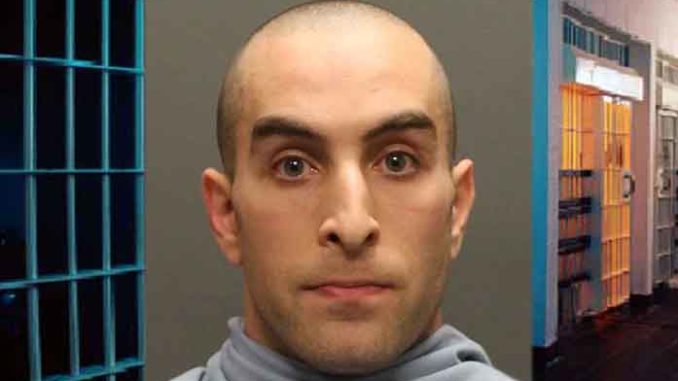
The Tucson man who could be put to death if convicted of the 2018 murder of a Deputy U.S. Marshal had been the subject of at least three emergency court orders for his involuntary commitment due to mental health concerns, federal court documents reveal.
Ryan Phillip Schlesinger is currently set to stand trial in March 2021 on first-degree murder in the shooting death of Deputy U.S. Marshal Chase White and for using a firearm during a crime of violence “knowing that the act created a grave risk of death.” U.S. Attorney Michael Bailey of the District of Arizona is seeking the death penalty for both charges.
Schlesinger has been in pretrial detention since Nov. 29, 2018 when he allegedly opened fire as law enforcement personnel sought to execute a warrant to take him in custody. He was named in a Title 36 petition, commonly known as an emergency mental health petition, just three days earlier.
Court records show Schlesinger is scheduled to appear before Senior Judge Raner Collins on Jan. 19 for a status conference in advance of a March 9 jury trial. The judge has also set a Feb. 19 deadline for resolving the case by a plea deal.
The trial, however, is not expected to happen anytime soon.
In October, the U.S. Attorney’s Office sought a court order seeking to compel disclosure of whether Schlesinger’s attorneys intend to introduce evidence at trial about the defendant’s mental health and which experts may be called to testify. The prosecutor also wants Schlesinger to “submit to an examination by an expert or experts of the government’s choosing” if a mental competency defense is going to be put forth.
In federal death penalty case, the defendant may seek to admit evidence of insanity or mental condition as an affirmative defense during trial or at sentencing, or to rebut evidence that the defendant had the mental state necessary to commit the offense.
But Schlesinger’s federal public defenders from Nevada say restrictions due to COVID-19 protocols the last several months have put them a long way from finalizing a defense strategy, let alone know which experts may be available to work with them on the case.
In fact, defense counsel called the government’s motion trying to force information on Schlesinger’s defense plans “astonishingly premature.”
“Quite simply, the government seeks to put the cart many, many miles before the horse,” the defense stated in a response to the motion to compel. “Simply put, after deciding to seek the most serious penalty available to it—the killing of another person—the government seeks to bulldoze through the procedures in place to protect the person it seeks to kill. This Court should summarily deny the government’s frivolous motion.”
Court records show Schlesinger was the subject of two involuntary mental health commitments -in August 2017 and August 2018- after he had contact with the Tucson Police Department’s mental health support team. Such commitments are commonly referred to as a Title 36.
During the 2017 contact, Schlesinger was found to be in possession of a handgun which officers were required by law to seize. He was Tasered after making threats against officers and reaching for the loaded gun.
Schlesinger’s 2017 commitment consisted of only seven days confinement, even though his caseworker noted “significant concerns regarding his homicidality.”
Months later, Schlesinger undertook “obsessive efforts” to regain possession of his gun and other property, including going to various TPD stations several times and even appearing at the home of the parents of a TPD sergeant.
Nothing is noted in public court documents about the 2018 commitment, but TPD’s mental health unit obtained a third emergency court order for another involuntary commitment on Nov. 26, 2018.
“After obtaining the petition, officers made several attempts to contact the defendant at his residence without success, despite evidence he was home,” the records state. “On November 29, 2018, the defendant shot and killed Deputy U.S. Marshal (White) while he was at the defendant’s residence with other federal officers attempting to arrest the defendant on a felony stalking warrant.”
Judge Collins has not yet ruled on the government’s motion to compel, but he is expected to vacate the upcoming March trial date given the amount of time the parties still need to prepare.
In order to obtain a death penalty sentence, the U.S. Attorney’s Office must prove Schlesinger committed the offenses against a federal officer engaged in official duties “after substantial planning and premeditation to cause the death of a person” and that he intended to kill more than one person during the incident.
Among the aggravating factors the U.S. Attorney’s Office intends to put forth to the court is Schlesinger’s history of engaging in “a continuous pattern of antagonist and threatening behavior towards law enforcement and persons in positions of authority including repeated threats of violence and stalking” as well as his lack of remorse for White’s death.
The other charges against Schlesinger stemming from the November 2018 incident during which White, a married father of four, was killed include three counts of attempted murder of a federal officer, four counts of assault on a federal office with a deadly weapon, and four counts of discharging a firearm in furtherance of a crime.
